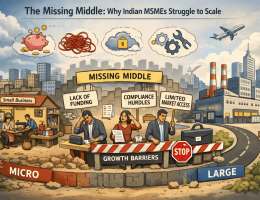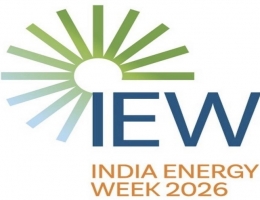
Empowering Women Entrepreneurs in MSMEs
Empowering Women Entrepreneurs in MSMEs: Bridging Gaps and Unlocking Potential
Waking up the Silent Giant – Empowering Women through Entrepreneurship was a powerful discussion at the India SME Forum’s 6th Annual Conference, highlighting the challenges and opportunities for women-led businesses in India. Panelists emphasized that while women entrepreneurs contribute significantly to the economy, they continue to face a credibility gap rather than a capability gap. Women-led entrepreneurship in the MSME sector holds immense potential for economic growth and social development. However, women entrepreneurs often face unique challenges, including limited access to credit, technology, and markets. Addressing these barriers requires a comprehensive strategy that includes financial inclusion, digital empowerment, skill development, and targeted policy interventions.
Another challenge discussed was the lack of market linkages and networking opportunities, which prevents many women-led businesses from scaling. "Women entrepreneurs need better access to industry networks, trade associations, and export promotion councils to scale their businesses," emphasized Ms. Starlene Sharma, Founding Partner, Green Artha.
The session also explored the transformative role of digital platforms and e-commerce, where digital literacy remains a significant barrier, requiring targeted training programs. The discussion also touched upon policy-level interventions, with panelists advocating for better awareness and accessibility of government schemes like Startup India and Women-Led Development Initiatives. The session concluded with a strong call to action, urging policymakers, financial institutions, and industry leaders to actively support women entrepreneurs and remove systemic barriers. “If India is to become a $5 trillion economy, women entrepreneurs cannot remain a silent force. It’s time to amplify their voices and remove the systemic barriers holding them back,” concluded Ms. Ankita Pandey, Director, Ministry of MSME. By leveraging financial support, digital tools, strong networks, and policy interventions, women entrepreneurs in India can transform from being the "silent giant" to becoming a dominant force in the economy.
As highlighted in the discussion, 98% of women-led enterprises are micro-enterprises, emphasizing the need to focus on this segment. One of the significant advancements in financial inclusion is the eShakti initiative, which has digitized self-help groups (SHGs), allowing them to maintain financial records and gain credibility with banks. This initiative has been transformative, ensuring that women entrepreneurs have better access to credit and financial monitoring.
"The manner in which they have digitized the self-help groups is amazing; it has all the financial records digitized, making them credible to banks," Ms. Sushma Morthania, Director General, India SME Forum.
Digital tools are also playing a crucial role in enhancing market access. With platforms like Facebook, Instagram, and WhatsApp, women entrepreneurs can reach global audiences without the constraints of traditional export channels. "Every day, millions come to our platforms to build their livelihoods, find new markets, and grow their businesses," emphasized Ms. Natasha Jog, Director & Head Public Policy, Instagram.
However, there is still a significant gap between entrepreneurship and exports. Many women-led micro-enterprises struggle to navigate international markets due to the complexity of trade regulations and quality standards. "Even though a lot of emphasis has been given to women entrepreneurship, there is still a huge gap in transcending from being an entrepreneur to being an exporter," pointed out Ms. Ankita Pandey, Director, Ministry of MSME. To bridge this gap, initiatives like the One District One Product (ODOP) program and the District Export Hub can be leveraged to integrate women entrepreneurs into the global supply chain.
Data availability is another critical issue. 43% of STEM graduates in India are women, but only 14% are employed, reflecting the underutilization of talent. Gender-disaggregated data is essential for identifying gaps and measuring progress. "We must request the government to put out gender-disaggregated data in the public domain so that we can examine our successes and address the gaps," Ms. Sushma Morthania, Director General, India SME Forum.
Additionally, financing remains a major hurdle. Many women entrepreneurs hesitate to seek funding due to risk aversion and lack of financial literacy. "More than 50% of our startups had women as co-founders, not because they were women, but because they were the best entrepreneurs," stated Dr. Nisha Taneja, Professor, ICRIER, highlighting the need for normalizing women’s access to funding.
Beyond financial support, networking, and mentorship are crucial. The Ministry of MSME has also introduced several reforms, such as increasing the credit guarantee cover for women entrepreneurs under CGTMSE to 90% and offering free ZED certification for women-led businesses. These initiatives aim to create a more inclusive ecosystem. "Though we are sector and gender-agnostic, it is our commitment to create a conducive ecosystem for women entrepreneurs," stated Ms. Ankita Pandey, Director, Ministry of MSME.
As India moves towards a digital-first economy, ensuring women entrepreneurs have the necessary skills to leverage AI, digital marketing, and e-commerce is vital. Programs like WhatsApp SE Apaar and DigiSakshar are training millions of women to harness digital tools for business growth.











